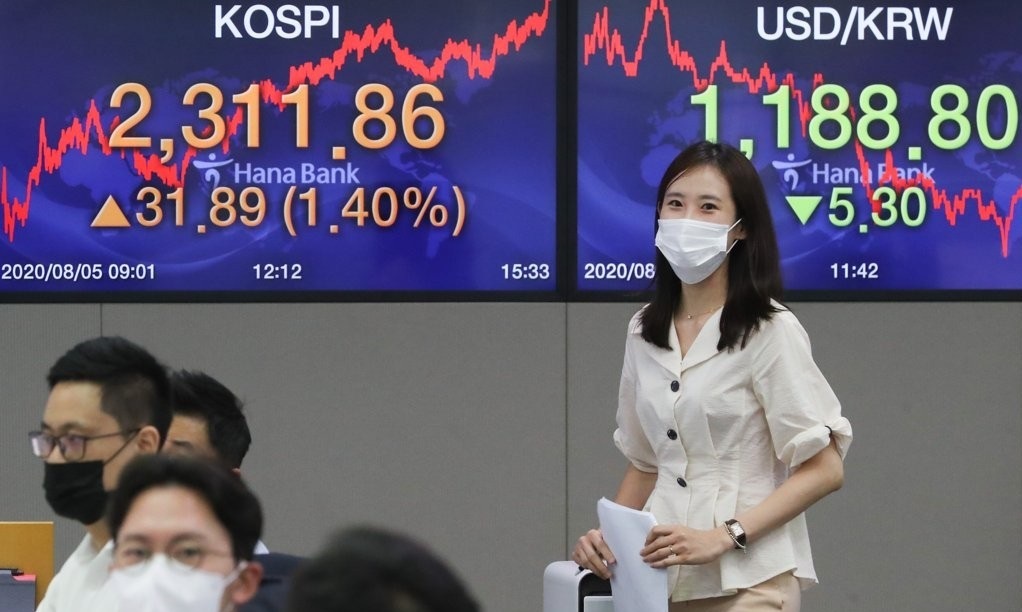South Korea’s stock market is on a bullish trend, with its main bourse Kospi setting record highs in recent weeks despite lingering concerns over the new coronavirus and its impact on the economy.
Buying by foreigners and institutional investors drove the Kospi index to 2,352.48 points in early morning trading Thursday. On Wednesday, the index crossed the 2,300-point mark for the first time since Oct. 2, 2018, and ended at 2,331.86 points.
Compared with a low of 1439.43 in March, the main bourse rose some 60 percent Thursday. The tech-heavy Kosdaq hit a high of 855.73 in intraday trading on the same day -- also the highest since Oct. 2, 2018.
The benchmark Kospi ended up 30.75 points, or 1.33 percent, at 2,342.61 while the Kosdaq ended at 854.12, up 0.81 percent.
Many market analysts offered positive views on the stock market for the rest of the year, saying the bullish momentum would likely continue for a while as there is plenty of liquidity in the market. Some even forecast the index reaching 2,400 points in the second half or next year, higher than the current target of 2,360.
“An upward trend led by abundant liquidity usually ends when there is more supply of stocks than cash flowing into the market,” said Park Seung-yeong, an analyst from Hanwha Investment & Securities. “The current bull market is not out of steam yet, considering the stock supply increased 10 trillion won ($8.5 billion) in value this year while liquidity provided by retail traders reached nearly 60 trillion won.”
The increasing participation of retail investors is pointed out as a main contributor to the increased liquidity as well as the latest Kospi rallies.
As of Tuesday, overall deposits in stock trading accounts stood at 49.2 trillion won, up some 4 trillion won from a month earlier. The number of valid stock trading accounts came in at 32.6 million, exceeding the number of economically active people in Korea, which is 28.3 million. The economically active population refers to people aged 15 or over who are working or seeking employment.
The balance of credit loans taken out by individuals for stock investment hit an all-time high of 14.5 trillion won, which is more than double the 6.4 million won recorded March 25.
“The US stock market’s recent rallies despite worsening unemployment there have helped improve investor sentiment in the Korean stock market,” said Seo Sang-young, an analyst form Kiwoom Securities. “Rising oil prices and a weak US dollar have sent positive signals to the domestic market.”
Due to the prolonged coronavirus pandemic, BBIG stocks, an acronym for the biotechnology, battery, internet and gaming industries, are expected to receive more attention than others, according to market watchers.
The government’s planned economic policy, called the Korean New Deal, introduced to nurture emerging alternative energy and digital industries and to prop up the virus-affected economy, could also provide additional momentum for the stock market down the road, they said.
Despite upbeat predictions for the stock market, some analysts warn, there are signs that the market is starting to overheat.
“The bourse has been rising without corrections recently, which in some sense means the market has been overvalued,” Kim Ji-san, chief analyst from Kiwoom Securities, said.
“The stock indices are not likely to drop sharply, but the current levels are not somewhere you may feel comfortable.”
By Kim Young-won (
wone0102@heraldcorp.com)





![[Herald Interview] How Gopizza got big in India](http://res.heraldm.com/phpwas/restmb_idxmake.php?idx=644&simg=/content/image/2024/11/20/20241120050057_0.jpg)


![[KH Explains] Dissecting Hyundai Motor's lobbying in US](http://res.heraldm.com/phpwas/restmb_idxmake.php?idx=644&simg=/content/image/2024/11/20/20241120050034_0.jpg)